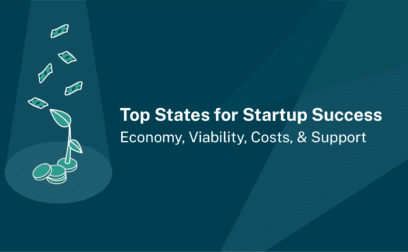TABLE OF CONTENTS
With a low cost of doing business and close proximity to multiple major cities, starting or growing a small business in West Virginia is an exciting adventure. Finding financing to fund your business can be tricky, but there are plenty of funding options out there for business owners in the state.
Learn more about business loans in West Virginia as well as alternative options and tips on applying.
In West Virginia, small businesses have access to various types of loans to address their financial needs. Common options include traditional term loans, where a lump sum is borrowed and repaid with interest over a specified period. Lines of credit are another option, providing flexibility for businesses to access funds as needed within a predetermined limit.
Government-backed loans, such as those guaranteed by the U.S. Small Business Administration (SBA), are also available in West Virginia. SBA loans often offer favorable terms and may have lower down payment requirements. Businesses can also explore loans designed for specific purposes like purchasing equipment or real estate.
Online or alternative loans offer a non-traditional route to funding with lower barriers to entry than traditional loans and fast application and funding processes. However, they often include higher interest rates or shorter repayment periods.
Business owners in West Virginia should assess their financial needs and eligibility before choosing a loan. Researching different lenders, including banks, credit unions and online lenders, can help identify the most suitable options. Additionally, consulting with financial advisors or local business development resources can provide valuable insights into available loan programs and increase the chances of securing funding.
Finding a business grant in West Virginia can get your business funding without having to pay it back. Start by researching government programs at the federal, state, and local levels. The Small Business Administration (SBA) is a key resource for federal grants, while the West Virginia Department of Commerce may offer state-specific options. Local economic development agencies and chambers of commerce can also provide information on grants tailored to the region.
Explore non-governmental sources, such as private foundations and corporate organizations, as many offer business grants. Use online databases, grant directories and networking with business associations to identify potential opportunities.
When looking for business grants, carefully review eligibility criteria and application requirements. Customize your grant proposal to fit the specific objectives of each opportunity. Some grants may require a detailed business plan or a demonstration of how the funds will be used to benefit the community.
Consider seeking assistance from business advisors, small business development centers or local chambers of commerce. These organizations can give you guidance on available grants, the application process and strategies to improve your chances of success.
Remember that competition for grants can be very high, so presenting a compelling case for why your business deserves the grant is important. Stay informed about deadlines, submit a well-prepared application and keep open lines of communication with the grant providers throughout the process.
Applying for a small business loan in West Virginia involves several key steps. Although each lender will have its own application process, following these general steps can help you be better prepared.
Keep in mind that specific steps and requirements may vary between lenders, so it’s always a good idea to consult with the chosen lender directly for precise instructions. Many lenders will assign a loan officer to guide you through the process, and keeping in touch with them can help you apply with ease.
Various alternative financing options are available for small businesses beyond small business loans. These alternatives serve different needs and circumstances:
Choosing the right alternative financing option depends on factors like the business’s financial situation, the purpose for the funding and the specific terms and conditions of each option. You can also mix and match solutions to get the funding you need.
The credit score required for a small business loan can vary depending on several factors. Traditional lenders, such as banks, often prefer higher credit scores, typically in the range of 680 or above. However, alternative lenders or those offering government-backed loans may be more flexible, considering lower credit scores, sometimes in the range of 500 to 600.
A higher credit score can help your odds of securing a loan. At the same time, higher credit scores can give you leverage to negotiate lower interest rates, longer repayment terms or lower down payments.
While credit score is a significant factor, lenders also look at other aspects of your financial profile, including the business’s financial health, cash flow and the purpose of the loan. This is why it’s smart to have a solid business plan ready to make your case during the loan application process.
Before applying for a small business loan, it’s a good idea to check your credit score, understand the specific requirements of the lender and take steps to improve your creditworthiness if necessary. Some lenders may also consider a personal guarantee or collateral as part of the loan application process.
The typical interest rates on a business loan in West Virginia can vary based on several factors like the type of loan, the lender, your creditworthiness and market conditions. For instance, SBA loans are tied to the U.S. Prime Rate, and currently average between 11.5% to 16.5% depending on the loan program and the amount of the loan.
For traditional term loans from banks, businesses with strong credit profiles may qualify for lower interest rates, typically ranging from around 7% to 12%. Alternative lenders and online platforms may provide a broader range of interest rates, often reflecting the risk associated with the borrower. These interest rates can go as high as 99%, so it’s important to review the terms and conditions before agreeing.
Business owners in West Virginia need to research and compare offers from different lenders. Carefully review the terms and conditions, including interest rates and any associated fees. Maintaining a strong credit history and financial profile can increase the likelihood of securing a loan with more favorable interest rates.
The time it takes to receive funds for a small business loan can vary depending on the lender’s processes and how complete the borrower’s application is. Traditional lenders, such as banks, often have a more extensive and detailed application, which may result in a longer approval timeline. It can take several weeks to a couple of months to complete the entire process, including the application review, underwriting and approval.
On the other hand, online lenders and alternative financing sources tend to have quicker turnaround times. Some online lenders can provide approval within a few days, and in some cases, funds may be disbursed shortly after approval.
SBA loans have extensive review and approval processes. Depending on the loan program, it can take up to six months for an SBA loan to fund.
To speed up the process, it’s important for business owners to have all required documentation ready and to respond promptly to any requests for additional information from the lender. Additionally, choosing a lender that fits the business’s needs and understanding the specific requirements of the selected loan can contribute to a smoother and potentially faster funding process.
Although it can seem overwhelming, a systematic approach is the best way to find the right funding for your business in West Virginia. Start by evaluating your business’s financial needs and defining the purpose of the funding. Take a good look at your business’s qualifications such as financial standing, annual revenue, credit history and your own credit score.
Research different funding options, including traditional banks, credit unions, online lenders and government-backed programs such as those offered by the Small Business Administration (SBA). Each source has its own advantages, terms and eligibility criteria.
Consider seeking guidance from local business organizations, chambers of commerce or small business development centers in West Virginia. These organizations often have insights into available funding opportunities and can provide advice on navigating the application process.
Networking can also be helpful when trying to find funding. Connect with other local business owners who may have experience securing funding in West Virginia. Their insights and recommendations can help you identify good lenders and understand the local business financing landscape.
Before committing to any funding option, carefully review the terms and conditions, including interest rates, repayment terms and any associated fees. Compare offers from different lenders to make sure you’re getting the most favorable terms for your specific business needs.
Looking for funding for your small business in West Virginia? Swoop has your back with different funding options and resources to help you get the funds you need. Get started today.
Daire made it happen! There is no doubt that Swoop sped up the process and found lenders that worked to our time scale rather than the other way round
Hocque Figureoa
Joint owner, F45 Virginia
Swoop was actually very helpful in helping us get our initial fundraising in place. Swoop was able to connect us with investors, with grant financing options and debt financing options.
Viler Lika
Founder, SingleKey
Pedja was amazing. Super supportive, understanding of our needs and wasn't pushy at all. We've been going back and forth with Swoop for over a year inquiring about different financing options and they were patient until we were ready!
Chris Skeates
F45 Multi-studio owner
Join the 95,000+ businesses just like yours getting the Swoop newsletter.
Free. No spam. Opt out whenever you like.
Kingfisher Way, Silverlink Business Park, Newcastle upon Tyne, NE28 9NX, UK
View in Google Maps35 Bull Street, Lewis Building, Birmingham B4 6AF, UK
View in Google MapsAberystwyth Innovation and Enterprise Campus
Gogerddan Campus
Aberystwyth University
Ceredigion
SY23 3EE
Dogpatch Labs, The CHQ Building, Custom House Quay, Dublin, Ireland
View in Google MapsSuite 801, Level 8, 84 Pitt Street, Sydney, NSW 2000, Australia
View in Google Maps43 W 23rd St, New York, NY 10010, United States
View in Google Maps21 Dreyer Street, Cape Town, South Africa, 7708
View in Google MapsClever finance tips and the latest news
Delivered to your inbox monthly
Join the 95,000+ businesses just like yours getting the Swoop newsletter. Free. No spam. Opt out whenever you like.




